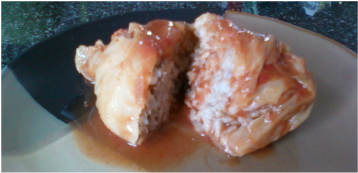
I don't think of myself as someone who reveres tradition. I am Ikea, not Ethan Allan. I enjoy coming up with a new and different entrée for Christmas dinner each year. I sometimes drink red wine with fish.
Yet I continue to make halupki.
Stuffed cabbage, as it is also known, is a traditional dish on my mother's side of the family. In a previous blog (May 26, 2011) I wrote about how it is one of the few connections I have to my ancestry. In contrast, my fiction writing is obsessed by the traditions of the Turks and Caicos Islands.
That pretty much sums it up. So why write about halupki again? Well, I made some yesterday. It's a labor-intensive effort; after cooking rice, blanching the cabbage leaves and mixing the filling, there's all that rolling up of meat mixture and cabbage to do. The mind wanders.
It touched down on the particulars of what I was doing. I noticed that before rolling I was using a paring knife to shave down the "spine" of each cabbage leaf, then tossing the shaved portion into the bottom of the roasting pot. This is not a necessary step. I do it only because my mother did it.
I suppose she had two reasons for this action: making the cabbage roll neater and providing spaces on the bottom of the casserole to prevent sticking. The first reason has nothing to do with flavor, and the second isn't needed with today's nonstick cookware. Yet I do it every time.
I am reminded of a story, the source of which I can't remember, of a woman who was preparing a roast. As she cut off the ends of the meat, her daughter asked her why she was doing that.
Surprised, she answered, "Because my mother always did." She decided to find out why, but the mother's answer was, "Because my mother did."
Fortunately the grandmother was still living, so they went to her. "Why did you always cut off the ends of the roast before putting it in the pan?" The answer: "My pan wasn't big enough."
One woman's logic is another's tradition. How much of our lives operates this way? Shouldn't we question whether our traditions are meaningful or "just because"?
Or wouldn't that be the traditional thing to do?
Yet I continue to make halupki.
Stuffed cabbage, as it is also known, is a traditional dish on my mother's side of the family. In a previous blog (May 26, 2011) I wrote about how it is one of the few connections I have to my ancestry. In contrast, my fiction writing is obsessed by the traditions of the Turks and Caicos Islands.
That pretty much sums it up. So why write about halupki again? Well, I made some yesterday. It's a labor-intensive effort; after cooking rice, blanching the cabbage leaves and mixing the filling, there's all that rolling up of meat mixture and cabbage to do. The mind wanders.
It touched down on the particulars of what I was doing. I noticed that before rolling I was using a paring knife to shave down the "spine" of each cabbage leaf, then tossing the shaved portion into the bottom of the roasting pot. This is not a necessary step. I do it only because my mother did it.
I suppose she had two reasons for this action: making the cabbage roll neater and providing spaces on the bottom of the casserole to prevent sticking. The first reason has nothing to do with flavor, and the second isn't needed with today's nonstick cookware. Yet I do it every time.
I am reminded of a story, the source of which I can't remember, of a woman who was preparing a roast. As she cut off the ends of the meat, her daughter asked her why she was doing that.
Surprised, she answered, "Because my mother always did." She decided to find out why, but the mother's answer was, "Because my mother did."
Fortunately the grandmother was still living, so they went to her. "Why did you always cut off the ends of the roast before putting it in the pan?" The answer: "My pan wasn't big enough."
One woman's logic is another's tradition. How much of our lives operates this way? Shouldn't we question whether our traditions are meaningful or "just because"?
Or wouldn't that be the traditional thing to do?
 RSS Feed
RSS Feed